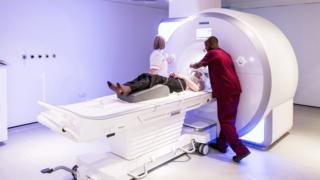Brexit: Warning over cancer treatment supplies after no deal
 Image copyright Science Photo Library
Image copyright Science Photo Library Senior doctors have called for ”urgent clarification” of plans to supply cancer treatments in the event of a no-deal Brexit, BBC Newsnight has learned.
In a letter to the prime minister, seen by Newsnight, they say a “dry run” of emergency deliveries earlier this year revealed problems in the system.
About one million patients in the UK receive medical radioisotopes for diagnosis or therapy each year.
The Department of Health said “action is being taken to safeguard supplies”.
Prime Minister Boris Johnson maintains that a no-deal Brexit – where the UK leaves the EU on 31 October with no withdrawal agreement in place – is not his aim.
Radioisotopes are radioactive atoms that can be used against cancer and are a key component of some types of scan.
Their supply chains operate on tight schedules, as the nuclear materials quickly decay and become unusable. And stockpiling supplies in advance of a potential no deal, as planned for some other medicines, is impossible.
The UK produced only one type of radioisotope, the Royal College of Radiologists told Newsnight. All other radioactive medical materials are imported – the “vast majority” from the EU.
The letter’s authors question whether they will reach hospitals in time if there are delays at the border. Delays could lead to isotope shipments missing the lorries booked for their onward journeys around the UK.
The Royal College of Radiologists, the British Nuclear Medicine Society and the UK Radiopharmacy Group cite issues that arose during a no-deal trial, when one major supplier struggled to get their material fast-tracked through customs. Other, smaller suppliers have reportedly had problems too.
The Royal College of Radiologists has previously warned about potential delays to tests and treatment that rely on radioisotopes but dummy runs in April raised fresh concerns.
In February, the Department of Health announced that in the event of a no-deal Brexit, the UK’s major radioisotope suppliers had committed to six-month air freight contracts.
This would act as a contingency, allowing them to increase the proportion of products flown in rather than brought in on ferries, where they are more susceptible to delays.
The groups want reassurances that “reported customs delays at East Midlands Airport will not happen in future”.
Because only a small number of lorry drivers are licensed to transport such radioactive materials, any delays can have knock-on effects.
“This means that any consignment which is late through customs may not make the timed delivery run, and there are no licensed people for a back-up delivery run,” said John Buscombe, president of British Nuclear Medicine Society (BNMS) and one of the letter’s signatories.
About 25 years ago, the laws changed so only specially trained people who hold a license can transport radioisotopes. The letter asks if more will be trained to cope with delays and changes to schedules.
‘No guarantee’
The medical groups say raising these issues is not scaremongering but trying to pre-empt potentially avoidable problems before they harm patient care.
For example, the BNMS said, at least one patient in Scotland had been unable to receive treatment for liver cancer on the planned day during the delivery trial as the radioisotopes had arrived too late.
“Any delay could mean too little of a product arrives at a hospital – meaning fewer patients will be able to be scanned or treated, or a radioisotope shipment might not be able to be used at all,” Dr Buscombe said.
Nicola Strickland, president of the Royal College of Radiologists, said despite planning she was “still concerned.”
“Until we hit the start of November, there is no guarantee that air transport contingencies put in place will work to deliver the current level of provision,” she said.
‘Rising costs’
The Royal College of Radiologists, the British Nuclear Medicine Society and the UK Radiopharmacy Group say although they are “very encouraged that radioisotopes are being specifically considered” in no-deal planning, they are “apprehensive about supplier readiness”.
And while “encouraged” the government has committed an additional £2.1bn towards preparing for no deal, they “look forward to more specific detail” on the spending.
They estimate that in the event of leaving with a deal, delivery costs will go up 15% – but this would potentially rise to 30% in the event of no deal, because of extra paperwork. These costs will be passed on to the taxpayer.
The groups write: “While we know the NHS routinely absorbs unplanned costs, nuclear medicine teams and finance managers need to know how to manage this at trust/health board and hospital level.”
A Department of Health and Social Care official said: “We are working closely with all our partners and our plans should ensure the supply of medicines and medical products remains uninterrupted.”
The Scottish government said it will work with NHS Scotland, the UK government and suppliers “to seek to avoid any disruption to patients”.
Scotland’s Health Secretary, Jeane Freeman, said: “It is completely unacceptable that the issue of medicine supply should even arise and the reason it has is entirely the result of the UK government’s reckless approach to Brexit.”
You can watch Newsnight on BBC Two weekdays at 22:30 or on iPlayer, subscribe to the programme on YouTube and follow it on Twitter.

